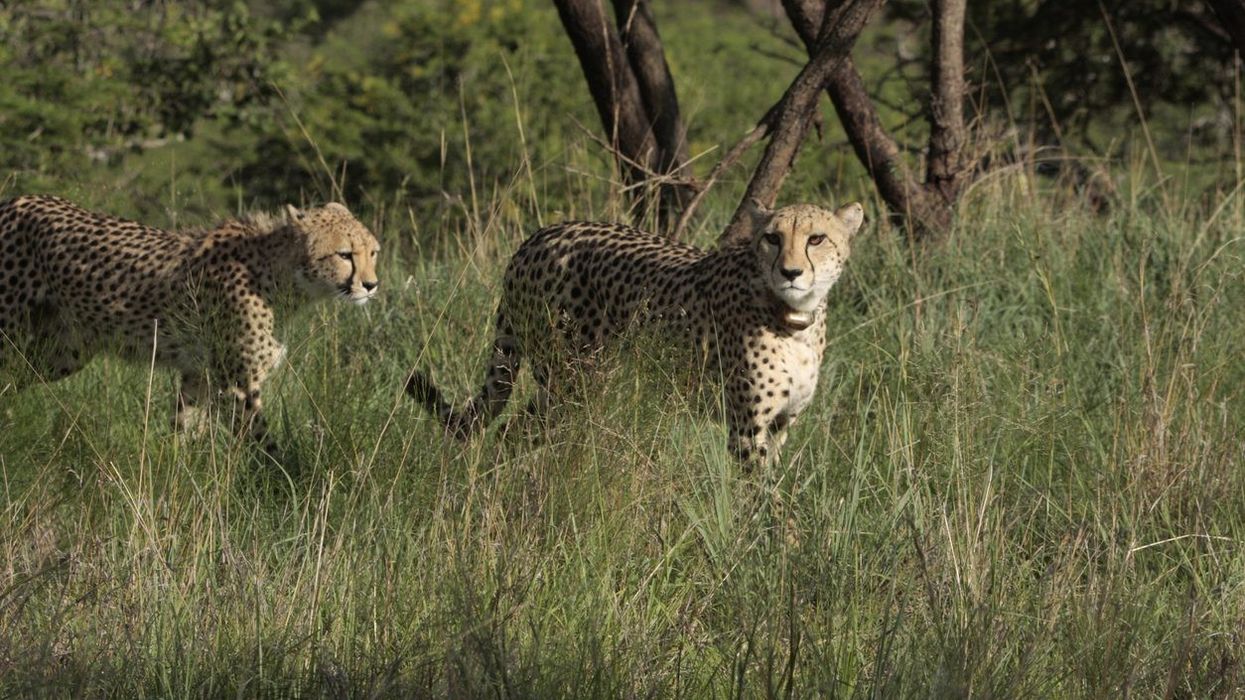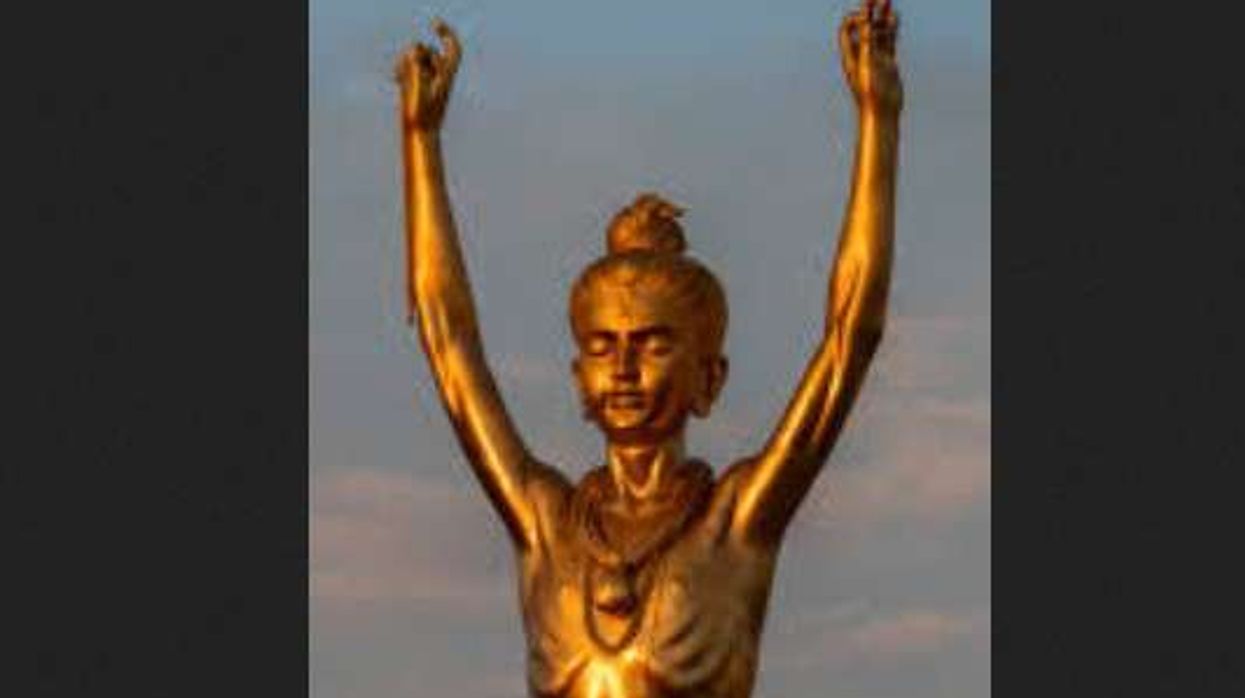The Kuno National Park (KNP) in Madhya Pradesh experienced the unfortunate deaths of two male cheetahs within a week, attributed to septicemia - blood poisoning by bacteria which was a result of the radio collars worn around their necks in the prevailing wet conditions, an expert said.
Male cheetah Suraj, who had been translocated from South Africa, died in Sheopur on Friday (14), and another translocated male cheetah, Tejas, died last Tuesday.
The death of two cheetahs pushed the fatality count to eight, including three cubs, in less than four months. The recent deaths have raised concerns about the cheetah reintroduction programme, which prime minister Narendra Modi launched with enthusiasm in September last year.
Vincent van der Merwe, a South African cheetah metapopulation expert, pointed out that the fatalities were caused by septicemia rather than external wounds. "Those were not wounds inflicted by other animals. They were cases of dermatitis and myiasis followed by septicemia," he said.
Merwe said he manages the Cheetah Metapopulation Project in South Africa on behalf of The Cheetah Metapopulation Initiative and was responsible for bringing cheetahs to India from South Africa.
Despite the deaths of the cheetahs, the expert remains optimistic about the cheetah project in India. "We still have 75 per cent of the founder population alive and well in India. So, all is still on track with observed mortality well within normal parameters for wild cheetah reintroduction," he said.
The collars were used to monitor the cheetahs' movements for safety and other purposes.
The state forest department officials suspected infighting among the animals when cheetah Tejas died, while cheetah Suraj was found dead with wounds around his neck and back.
A forest official, speaking on the condition of anonymity, said that they suspected both cheetahs died due to an infection. "But before we could act, the infection was spreading and taking its toll. It spreads very fast," he added.
Despite attempts to contact Principal Chief Conservator of Forests (Wildlife) J S Chauhan and his deputy Subharanjan Sen for comments on the cause of the cheetahs' death and the post-mortem reports, no response was received.
Madya Pradesh forest minister Vijay Shah, on Friday said that the precise cause of Suraj's death would be revealed through the post-mortem report.
When questioned about the overall fatalities, Shah highlighted that the three deceased cubs had been malnourished from birth, while other deaths were a result of typical animal behaviour such as fights during mating or over food.
He rejected any allegations of mismanagement leading to the deaths, emphasising that the governments of India, South Africa, and Namibia were all involved in the cheetah management process, and all actions were being carried out according to their directions.
"Therefore, it is not proper to say these (deaths) were due to negligence. The PMO (Prime Minister's Office) is keeping a close watch on everything. Everything is being done on the direction of the PMO. There is no negligence on our part," he said.
Post-mortem reports of the two cheetahs have been sent for examination, and efforts are being made to understand the cause of their deaths.
Meanwhile, on Sunday (16), the National Tiger Conservation Authority (NTCA) dismissed media reports linking the deaths of the big cats to factors like radio collars, stating that such attributions were based on "speculation and hearsay, without scientific evidence."
However, some experts involved in the cheetah reintroduction project have acknowledged that a male cheetah from South Africa died due to an infection caused by radio collar use.
Following a Cheetah Project Steering Committee meeting on Monday, an official suggested that all radio-collared cheetahs could be brought back to their enclosures for closer monitoring.
Additionally, another expert from South Africa is expected to arrive at the Kuno National Park (KNP) on Tuesday (18) to provide essential insights on cheetah observation and treatment.
During the meeting, the possibility of using drones connected to radio collars for monitoring the cheetahs in adverse weather conditions or over challenging terrains, including during the monsoon season, was also discussed.
The South African experts have requested the Indian government to keep them updated on the investigation into the cheetah deaths, as well as any planned additional measures and related developments.
During discussions, one of the experts involved in the cheetah project informed the committee that losing 50 per cent of the founder population within the first year of release into the wild is considered acceptable within established standards.
Furthermore, the experts pointed out that no radio collar-related issues have been encountered in South Africa, and to prevent such mortalities in India, innovative management actions will be necessary.
The cheetah project is ongoing, and several measures are being planned to support its success, including the establishment of a Cheetah Research Centre, landscape-level management of forest areas, deployment of additional frontline staff, and the formation of a Cheetah Protection Force.
Despite the setbacks, forest officials and experts are determined to preserve the cheetah population.
The goal is to ensure the long-term genetic and demographic viability of the cheetah population in India.
Currently, 11 cheetahs are in free-ranging conditions, while five, including a cub born in India, are kept in quarantine enclosures.
On September 17 last year, eight Namibian cheetahs - five females and three males were released into quarantine enclosures at KNP. In February, 12 more cheetahs arrived at KNP from South Africa.
The addition of four cubs resulted in a total count of 24 cheetahs initially, but due to eight deaths, the number is now 16.
The project is under close observation, with actions taken to address challenges and improve conservation efforts.
Consequently, a top wildlife official in Madhya Pradesh has been removed raising questions about the high-profile project.
Jasbir Singh Chauhan was transferred from his post by the state forest department on Monday (17), it said in a statement without giving reasons for his removal.
Additionally, India’s environment ministry said on Sunday (16) it would be premature to declare the programme a success or failure "since cheetah reintroduction was a long-term project."
The reintroduction is the first intercontinental relocation of cheetahs and the programme aims to bring in about 100 of the animals over the next decade.
Furthermore, scientists from the Cheetah Research Project at Leibniz-IZW in Namibia had earlier said the relocation programme ignored "spatial ecology", as the KNP was much smaller than the spaces the big cats usually need to thrive.
The fastest land animal was declared extinct in India back in 1952.
(With inputs from PTI)












